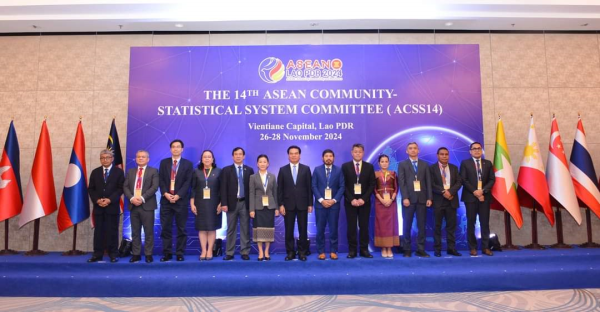ຂປລ
The 14th ASEAN Community Statistical Committee (ACSS14) meeting opened today in Vientiane.

(KPL) The 14th ASEAN Community Statistical Committee (ACSS14) meeting opened today in Vientiane.
The event is chaired by Mr. Phet Phompiphak, Minister of Planning and Investment, and attended by heads of statistical offices from all 10 ASEAN member countries, with Timor-Leste participating as an observer.
During the meeting, statistical leaders from ASEAN countries will collaborate, share experiences, and explore new innovations in statistics. Their goal is to enhance the compilation of comprehensive, timely official statistical reports that will enable governments to respond quickly to regional and global changes.
Mr. Phet Phompiphak highlighted that the Lao PDR is one of the ASEAN countries with high economic growth, averaging 7% over the five years prior to the Covid-19 pandemic.
The country is currently in a recovery phase following the pandemic and the subsequent economic and financial crisis.
For 2024, economic growth is projected to reach the planned 4.5%.
Laos’ key drivers of economic growth include the production of export goods such as electricity, and the service sector, which is benefiting from the Lao-China railway which facilitates tourism, transportation, and international trade, which not only benefits Laos but the entire region.
However, there are still significant challenges, particularly in eradicating poverty under the Sustainable Development Goals. Other challenges include currency instability, inflation remaining in double digits, a limited labor force, and a lack of skills and expertise to meet market demands.
Compared to other ASEAN countries, Lao PDR faces several socio-economic development challenges, including the development of measurement tools and the national statistical system. There are also difficulties in meeting government needs for statistical data in terms of quantity, quality, and timeliness.
The 9th Five-Year Socio-Economic Development Plan (2021-2025) is preparing a summary of its implementation, and the National Statistics Center is preparing for the 5th National Population and Housing Survey in 2025.
To ensure the provision of accurate and timely information for the government, the Minister of Planning and Investment called on the delegates to learn from each other’s experiences and apply them in their work. He emphasized the importance of improving statistical data collection at the ministerial, sectoral, local, and grassroots levels, ensuring that data accurately reflects the realities of socio-economic development at the local level.
KPL